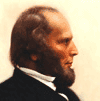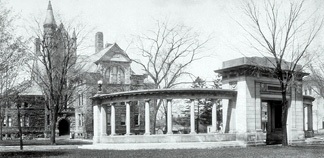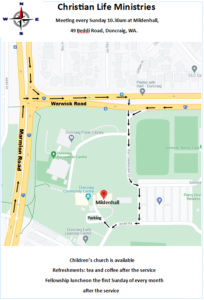Charles Grandison Finney
 Charles G. Finney was one of the most Spirit–filled ministers of the gospel of Jesus Christ in the history of the Christian church. He laboured in the ministry for more than 40 years in the United States of America and Great Britain. Everywhere this man went, souls were converted to Christ and revival fires were kindled.
Charles G. Finney was one of the most Spirit–filled ministers of the gospel of Jesus Christ in the history of the Christian church. He laboured in the ministry for more than 40 years in the United States of America and Great Britain. Everywhere this man went, souls were converted to Christ and revival fires were kindled.
The fruit of his labours were so evident and far-reaching that one prominent minister said that the awakening was “the greatest revival of religion the world had ever seen in so short a time.” It has been conservatively estimated that over 500,000 people were converted to Christ under his ministry.
At different points in his life’s journey he was a lawyer, pastor, professor, and college president.
In 1835, he moved to Ohio where he became a professor and later president of Oberlin College from 1851 to 1866. Oberlin became active early in the movement to end slavery and was among the first American colleges to co-educate blacks and women with white men.
He was born in Connecticut in 1792. he was well educated at Oneida Academy in Clinton. He was ordained in 1824 as a Presbyterian minister. He emphasized the authority of the Bible and the need of regeneration and the discipline of daily commitment to the Lord Jesus Christ. In the autumn of 1821, he received not only a pardon for his sins, but he also received a mighty baptism of the Holy Spirit. Finney takes us back over nineteen hundred years to teach us about importunity in prayer. Finney says:
“Observe, those who gathered in the upper room and the work that they had before them. They had a promise of power to perform it. They were admonished to wait until the promise was fulfilled. How did they wait? Not in listlessness or inactivity; … not by going about their business, and offering an occasional prayer that the promise might be fulfilled; but they continued in prayer, and persisted in their suit till the answer came.”
They learned the invaluable lessons of waiting and persistent determination to receive what God has already promised. Finney said:
“It will do no good to speak of spiritual power while your heart is in a hardened, waste, and unplowed state. The farmer might just as well sow his grain on the rock.”
Finney prayed:
“Heavenly Father, may my faith always be welded to You. Lead me into deeper and deeper baptisms of your Spirit that I might glorify Jesus through all my life.”
Bringing in the sheaves
God has already promised this is His word: “I will pour out my Spirit in the last days.” (Joel 2:28) Charles G. Finney said: “A revival is no more a miracle than a crop of wheat.”
In Finney eyes, this indeed was one of the spiritual secrets to winning the lost to Christ. When he spoke great numbers of people were bowed down under great conviction of sin. The most intelligent and influential men were deeply convicted by the power of the Holy Spirit that accompanied him. His ministry was with such power that it would make the stoutest men writhe in the seats as if a sword had pierced through their hearts. After he had prayed in a low gentle voice, many would leave his meetings sighing and weeping because they were deeply convicted of their sinful state.
We are looking for a harvest of souls for the kingdom of God. In the Psalms we find a passage that unfolds the mystery of a spiritual harvest:
“He who continually goes forth weeping, bearing seed for sowing, shall doubtless come again rejoicing, bringing his sheaves with him.” (Psalm 126:6 NKJV).
Acknowledgements: references
Acknowledgements: Reference.







